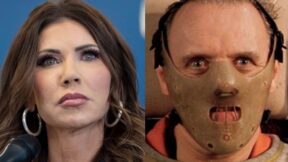Justice Ketanji Brown Jackson Hits Trump Lawyer With Devastating Question At Immunity Hearing
Justice Ketanji Brown Jackson hit Trump attorney John Sauer with a fairly devastating question during a Supreme Court hearing on former President Donald Trump’s claim of “absolute immunity.”
Sauer is the attorney who argued at an appeals court hearing that a president could order Seal Team Six to assassinate a political rival and not face prosecution unless he were impeached and convicted first.
Trump lost that appeal unanimously, and on Thursday, the Supreme Court heard oral arguments on Trump’s appeal of that appeal — including Sauer’s assassination theory.
Seconds after that stunning exchange, Justice Jackson asked Sauer to explain “What was up with the pardon?”:
JUSTICE KETANJI BROWN JACKSON: Isn’t isn’t the work, though, of the improper motives, at least in the absolute immunity context, to tell us what are official acts and what are not. I mean, I understood that even in the first of all, your ask is absolute immunity, isn’t it? And that’s your your position is you want the same kind of doctrine that we’ve applied in other contexts. When we say an official has absolute immunity. And my understanding is that when we say that we mean for their official acts. Is that right?
JOHN SAUER: Yes.
JUSTICE KETANJI BROWN JACKSON: Okay. So any official acts then in that world, the real decision making from a court standpoint is whether or not something is an official act or not. Correct?
JOHN SAUER: That is an important determination, by all means.
JUSTICE KETANJI BROWN JACKSON: I mean that’s the determination in the absolute immunity world, because if you determine that it’s an official act, then the principle is that you get immunity for it. Correct?
JOHN SAUER: That is correct.
JUSTICE KETANJI BROWN JACKSON: All right. So my question and I think the Chief Justice may have asked this at the beginning, is how do you determine what or maybe Justice Thomas, how do you determine what is an official act?
And when we’re talking about the kinds of scenarios the Justice Sotomayor brought up. One could say that when the president is using the trappings of his office to achieve a personal, gain, then he’s actually not acting officially, even if the doctrine was absolute immunity. So what do you say about that?
JOHN SAUER: Two things in response to that first and last point. That allegation that this was really motivated by an improper private purpose could be made in every single case.
JUSTICE KETANJI BROWN JACKSON: No, I understand that, but but it would have to be made. I’m just trying to assess, even if we had the doctrine of absolute immunity, that same allegation and the facts related to it would come in because the person would be arguing that he was not acting in his official capacity. He wasn’t doing something official. He was doing it personal. Correct?
JOHN SAUER: The I agree, the the objective. I’m not sure I agree, but but the point I would make in response to that is in Fitzgerald against Nixon. This court emphasized that would result in an intrusive discussion or determination of the president’s personal motives for every official act. And again, this is not just in the case of the presidency.
JUSTICE KETANJI BROWN JACKSON: Alright, can I just ask you another another quick question before my colleagues take it over here? At the beginning of your analysis, when you were giving your opening statement, you were talking about, you know, you suggested that the lack of immunity and the possibility of prosecution in the presidential context is like an innovation.
And I understood it to be the status quo. I mean, I understood that every president from the beginning of time, essentially, has understood that there was a threat of prosecution if for no other reason than the the Constitution suggests that they can be prosecuted after impeachment.
That, you know, the Office of Legal Counsel has said forever that presidents are amenable to a threat of prosecution, and they have continued to function and do their jobs and do all the things that presidents do. So it seems to me that you are asking now for a change in what the law is related to immunity.
JOHN SAUER: I would quote from what Benjamin Franklin said at the Constitutional Convention, which I think reflects best the founders original understanding and intent here, which is at the Constitutional Convention. Benjamin Franklin said history provides one example only of a chief magistrate who was subject to public justice, criminal prosecution, and everybody cried out against that.
JUSTICE KETANJI BROWN JACKSON: So I understand, but since Benjamin Franklin, everybody has thought, including the presidents who’ve held the office, that they were taking this office subject to potential criminal prosecution, no.
JOHN SAUER: I don’t. I see the opposite. I see all the evidence going the other way. Marbury against Madison, Mississippi against Johnson, discussed this broad immunity principle that —
JUSTICE KETANJI BROWN JACKSON: So what was up with the pardon? What was up with the pardon for President Nixon?
JOHN SAUER: I think it.
JUSTICE KETANJI BROWN JACKSON: If everybody thought that presidents couldn’t be prosecuted, then what was that about?
JOHN SAUER: Well, he was under investigation for both private and public conduct at the time. Official acts and private conduct.
I think everyone has properly understood that the president since like President Grant’s carriage riding incident, everyone has understood that the president could be prosecuted–
Watch above via MSNBC’s Trump on Trial: Presidential Immunity coverage.
New: The Mediaite One-Sheet "Newsletter of Newsletters"
Your daily summary and analysis of what the many, many media newsletters are saying and reporting. Subscribe now!






Comments
↓ Scroll down for comments ↓